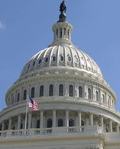
COVID-19 legislation in Congress has stalled as states begin to reopen and the latest jobs report shows some signs of life in the economy. Though unemployment applications increased, May saw the addition of over 2 million jobs as people return to work. This uptick has led the Senate’s Republican majority to conclude that another relief package will not be needed until late July. COVID-19 cases, however, are tracking upward again, with officials in some states warning that stay-at-home orders may be reimposed.
Meanwhile, federal agencies have continued work on COVID-19 vaccines and President Trump announced that he will end the U.S.’s relationship with the World Health Organization.
President Trump to Withdraw U.S. from the WHO
Congressional Appropriations Process Begins
Congress Examines Disproportionate Impacts of COVID-19 on Communities of Color
Vaccine and Treatment Development Progresses
GAVI Funding Mechanism for COVID-19 Vaccines
Global Health Security and Diplomacy Act Introduced
President Trump to Withdraw U.S. from the WHO
Claiming that the WHO refused to implement urgently needed reforms, President Trump on May 29 said the U.S. would terminate its relationship with the WHO. The President also claimed that the U.S. funding contribution will be redirected to other global health efforts. Withdrawal, however, is not a legally defined process, and it remains unclear if President Trump meant full withdrawal when he said the U.S. “relationship” would be terminated. There is no direct withdrawal provision in the WHO’s constitution, though the U.S. Congress reserved the right to withdraw after one year’s notice when it approved U.S. membership in 1948.
It also remains unclear if Congress will acquiesce to withdrawal or what power they have to prevent it. Congressional Republicans are broadly supportive, but some key Republicans, like Senate HELP Committee Chairman Lamar Alexander, have expressed concerns that withdrawal will be detrimental to COVID-19 vaccine development. In addition, CDC Director Robert Redfield told the House Appropriations Committee’s health subcommittee that the CDC will continue to collaborate with the WHO.
ASTMH has expressed its grave concerns about the decision in a
Letter co-signed by over 200 other organizations. ASTMH also sent a message to all members asking them to Take Action and send a letter to Congress requesting their continued support of WHO.
Congressional Appropriations Process Begins
Congress will begin its appropriations process for Fiscal Year 2021 this month. Contrary to usual practice, the Senate will bring committee markups of appropriations bills before the House of Representatives. The Senate Appropriations Committee will begin its work the week of June 22, while the House Appropriations Committee will start the week of July 6. Due to the late start to markups, it’s highly unlikely that Congress will be able to pass all 12 appropriations bills by the end of the fiscal year on September 30. In that case, Congress will most likely pass a short-term bill to fund the government past the November general election. Former CDC Director Tom Frieden has proposed taking public health preparedness outside of the usual budget proceedings and accounting in what he calls Health Defense Operations. This will allow more funding for these programs without corresponding cuts elsewhere in the budget. ASTMH has joined other organizations in sending a
letter to House and Senate Appropriations Committees in support of this effort.
Congress Examines Disproportionate Impacts of COVID-19 on Communities of Color
Congress has also held a series of hearings on racial disparities in the impact of COVID-19, hearings that have taken on a new urgency in the wake of George Floyd’s death and the subsequent protests. The House Oversight Committee, House Select Subcommittee on the Coronavirus Crisis, and the House Committee on Ways and Means have all held hearings on the issue, while the Senate Special Committee on Aging plans to hold one in July. In these hearings Members of Congress have pushed health officials to ensure that vaccine trials are diverse and reflect the overall population.
Vaccine and Treatment Development Progresses
Moderna announced that it will begin a final-stage trial for its COVID-19 vaccine in July. The study will include 30,000 people and be conducted with NIH. Meanwhile, Johnson & Johnson has moved up the first trials for its vaccine candidate to July after previously saying trials would start in September, and the Department of Defense will give $60 million to Novavax for the development of its vaccine candidate. In return for the funding, Novavax agreed to provide 10 million vaccine doses by the end of the year for Phase 2 and Phase 3 trials, or for emergency use by military personnel and their families.
Monoclonal antibody treatments are also progressing, with BARDA, in partnership with the Defense Advanced Research Projects Agency (DARPA), announcing it will provide $23.7 million to AstraZeneca for a Phase I clinical trial.
GAVI Funding Mechanism for COVID-19 Vaccines
GAVI has launched the GAVI Advance Market Commitment for COVID-19 Vaccines, which aims to raise $2 billion for vaccine development, production and access. GAVI says the mechanism is the first step toward a broader COVID-19 Global Vaccine Access Facility. AstraZeneca has already guaranteed 300 million doses of its eventual vaccine through the mechanism, and initial donors include the Bill & Melinda Gates Foundation, Canada, Italy, Norway and the United Kingdom.
Global Health Security and Diplomacy Act Introduced
Sen. Jim Risch (R-ID), chairman of the Senate Foreign Relations Committee, Sen. Ben Cardin (D-MD) and Sen. Chris Murphy (D-CT) introduced the Global Health Security and Diplomacy Act (S. 3829) on May 22. The bill will designate a State Department coordinator for foreign assistance and diplomacy, but would keep PEPFAR and non-infectious disease global health activities separate. The bill will also authorize participation in CEPI, authorize a Trust Fund for Global Health Security at the World Bank and authorize $3 billion for Fiscal Years 2021-2025 for the bill’s programs.